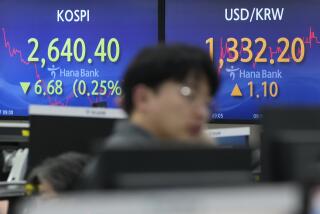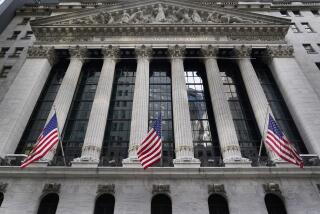Tokyo Stock Decline May Have Bottomed Out : Markets: But analysts don’t expect a solid upturn for months.
- Share via
TOKYO — Tokyo stocks may finally have hit the bottom of their recent plunge but are certainly not headed much higher as they pick their way across tricky terrain in the months ahead.
After the key Nikkei average dived to a 5 1/2-year low on Thursday of last week, it recovered 982.54 points or 5.92% to close at 17,580.69 Friday, raising hopes that the free fall is over.
But the months ahead are unlikely to bring good news for stocks.
May brings corporate earnings announcements, and there are worries that results will again be bleak. June sees futures settlements and the threat of arbitrage unwinding. July offers upper house elections and prospects of political turmoil, analysts said.
“We may not see the same volatility over the next two or three months as we’ve had the last two or three weeks, but lack of volatility is enervating,” said Simon Smithson of Kleinwort Benson International. “We expect a long, hot, sticky summer.”
The corporate results of firms that closed their books on March 31 will come out in May. Analysts expect poor results but wonder if the longer-than-expected economic slowdown and unforeseen weakness of stocks will make them worse than anticipated.
“Nobody thought the Nikkei could be below 20,000 on March 31, so many corporations must be sitting on a lot of book losses they didn’t expect,” said Kenzo Doi of Kokusai Securities.
The bad news may not end there, said Kleinwort’s Smithson. The economy is still slowing and companies may face a collapse of profits in the first half of the current fiscal year. Early signs of that should start appearing over the summer, he said.
June futures contracts will be settled June 12, and arbitragers will be unwinding or rolling over whatever is left of the 1.32 billion shares they now hold ahead of that date.
Arbitragers, who simultaneously trade stocks and futures to profit from the spread between the two, must either sell stocks held against June futures by settlement day or roll them over into more distant September positions.
Fears of unwinding usually tend to be overblown, but the current low price and volume levels make any selling pressure unwelcome.
“The number of positions seems to be shrinking but still bears watching,” said Kokusai’s Doi. “With many public holidays coming up, that could mean thinner volume and more volatility.”
July brings national elections for half the seats in parliament’s upper house, which the ruling Liberal Democratic Party lost control of in 1989.
The loss did not seriously hurt the LDP because it retains its grip on the lower house, but its prestige was dealt a blow and it toppled then-Prime Minister Sosuke Uno.
A poor showing this time could have the same effect on Prime Minister Kiichi Miyazawa and usher in a period of factional fighting.
“It will obviously be a nerve-racking time for the market, particularly if the LDP looks on its way to another beating,” said Smithson. But politics only accentuates market trends in Japan--it does not set them, he said.
Whatever the hurdles ahead, market participants are happy that the recent drastic stock plunge seems to be over.
The Nikkei shed 2,747.80 points or 14% in the first seven trading days of April to close at 16,598.15, its first close below 17,000 since November, 1986.
Few expect strong gains ahead, however. They see the Nikkei’s upper limit around 19,000 in the near term.
The economy is considered likely to start picking up early next year, and the market could start anticipating better times ahead in late summer, analysts said.
“I don’t see why the Nikkei shouldn’t head toward 20,000 around summer’s end,” said a Nomura Securities analyst.
More to Read
Inside the business of entertainment
The Wide Shot brings you news, analysis and insights on everything from streaming wars to production — and what it all means for the future.
You may occasionally receive promotional content from the Los Angeles Times.










